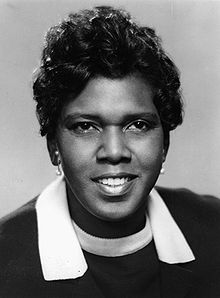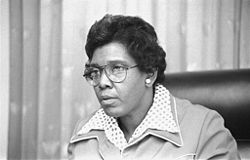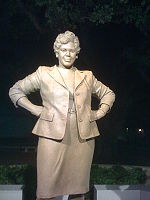- Barbara Jordan
-
For the tennis player, see Barbara Jordan (tennis).
Barbara Jordan 
Member of the U.S. House of Representatives
from Texas's 18th districtIn office
January 3, 1973 – January 3, 1979Succeeded by Mickey Leland Texas State Senator from District 11 In office
1967 – 1973Preceded by William T. "Bill" Moore Succeeded by Chet Brooks Personal details Born February 21, 1936
Houston, TexasDied January 17, 1996 (aged 59)
Austin, TexasPolitical party Democratic Profession Attorney Religion Baptist Barbara Charline Jordan (February 21, 1936 – January 17, 1996) was an American politician who was both a product and a leader, of the Civil Rights movement. She was the first African American elected to the Texas Senate after Reconstruction and the first southern black female elected to the United States House of Representatives. She received the Presidential Medal of Freedom, among numerous other honors. On her death she became the first African-American woman to be buried in the Texas State Cemetery. The main terminal of Austin-Bergstrom Airport is named for her.
Contents
Life and career
She campaigned unsuccessfully in 1962 and 1964 for the Texas House of Representatives.[1] Her persistence won her a seat in the Texas Senate in 1966, becoming the first African American state senator since 1883 and the first black woman to serve in that body.[1] Re-elected to a full term in the Texas Senate in 1968, she served until 1972. She was the first African-American female to serve as president pro tem of the state senate and served one day, June 10, 1972, as acting governor of Texas.
In 1972, she was elected to Congress, the first woman to represent Texas in the House in her own right (the first woman from Texas, Lera Thomas, had been elected as a stand-in for her husband, Albert Thomas). She received extensive support from former President Lyndon B. Johnson, who helped her secure a position on the House Judiciary Committee. In 1974, she made an influential, televised speech before the House Judiciary Committee supporting the impeachment of Johnson's successor as president, Richard M. Nixon.
In 1976, Jordan, mentioned as a possible running mate to Jimmy Carter of Georgia,[1] became instead the first African-American woman to deliver the keynote address at the Democratic National Convention.[1] Her speech in New York that summer was ranked 5th in "Top 100 American Speeches of the 20th century" list and was considered by many historians to have been the best convention keynote speech in modern history. Despite not being a candidate, Jordan received one delegate vote (0.03%) for president at the convention.
Jordan retired from politics in 1979 and became an adjunct professor teaching ethics at the University of Texas at Austin Lyndon B. Johnson School of Public Affairs. She again was a keynote speaker at the Democratic National Convention in 1992.
In 1994 and until her death in 1996, Jordan chaired the U.S. Commission on Immigration Reform, which advocated increased restriction of immigration, called for all U.S. residents to carry a national identity card and increased penalties on employers that violated U.S. immigration regulations.[2][3] Then-President Clinton endorsed the Jordan Commission's proposals.[4] While she was Chair of the U.S. Commission on Immigration Reform she argued that "it is both a right and a responsibility of a democratic society to manage immigration so that it serves the national interest.” Her stance on immigration is cited by opponents of current US immigration policy who cite her willingness to penalize employers who violate US immigration regulations, to tighten border security, and to oppose amnesty or any other pathway to citizenship for illegal immigrants[citation needed] and to broaden the grounds for the deportation of legal immigrants.[5]
Legislation
Jordan supported the Community Reinvestment Act of 1977, legislation that required banks to lend and make services available to underserved poor and minority communities. She supported the renewal of the Voting Rights Act of 1965 and expansion of that act to cover language minorities. This extended protection to Hispanics in Texas and was opposed by Texas Governor Dolph Briscoe and Secretary of State Mark White.
Personal life
Jordan attended Texas Southern University and pledged Delta Sigma Theta Sorority. Barbara was a national champion debater, defeating her opponents from such schools as Yale and Brown and tying Harvard University.
In 1956, she graduated magna cum laude from Texas Southern with a double major in political science and history. She expressed an interest in attending Harvard University School of Law, but opted instead to go to Boston University School of Law, and graduated in 1959.
In 1973, Jordan began to suffer from multiple sclerosis. She had difficulty climbing stairs, and she started using a cane and eventually a wheelchair. She kept the state of her health out of the press so well that in the KUT radio documentary Rediscovering Barbara Jordan, President Bill Clinton stated that he wanted to nominate Jordan for the United States Supreme Court, but by the time he could do so, Jordan's health problems prevented him from nominating her.[6]
Jordan's partner of close to 30 years was Nancy Earl. Jordan met Earl, an educational psychologist who would become an occasional speech writer in addition to Jordan's partner, on a camping trip in the late 1960s.[1] Jordan never publicly acknowledged her sexual orientation, but in her obituary, the Houston Chronicle mentioned her long relationship with Earl.[7][8] However, Jordan biographer Mary Beth Rogers, author of "Barbara Jordan: American Hero," had not confirmed that the former congresswoman was a lesbian.[9] After Jordan's initial unsuccessful statewide races, advisers warned her to become more discreet and not bring any female partners on the campaign trail.[1][10]
Jordan narrowly escaped death by drowning in July 1988, when Earl pulled her from their backyard swimming pool.[11] Her death in 1996 was caused from complications of pneumonia.[12]
Awards, honors and memorials
In 1993, Jordan was honored with the Elizabeth Blackwell Award from Hobart and William Smith Colleges. Jordan was awarded the Presidential Medal of Freedom in 1994. The many other honors given to her include her election into both the Texas and National Women's Hall of Fame; she was awarded the prestigious United States Military Academy's Sylvanus Thayer Award, becoming only the second female awardee.
Upon her death on January 17, 1996, Jordan lay in state at the LBJ Library on the campus of The University of Texas at Austin. She was buried in the Texas State Cemetery in Austin, and was the first black woman interred there. Her papers are housed at the Barbara Jordan Archives at Texas Southern University.
The main terminal at Austin-Bergstrom International Airport is named after her, as are an elementary school in Odessa, Texas, a middle school in Cibolo, Texas; Barbara Jordan High School in Houston and a Young Men's Christian Association in Martinsville, Indiana.[13]
The Kaiser Family Foundation currently operates the Barbara Jordan Health Policy Scholars, a fellowship designed for people of color who are college juniors, seniors, and recent graduates as a summer experience working in a congressional office.
On March 27, 2000, a play on Jordan's life premièred at the Victory Garden Theater in Chicago, Illinois.[14] Titled, "Voice of Good Hope", Kristine Thatcher's biographical evocation of Jordan's life played in theaters from San Francisco to New York.[15]
On April 24, 2009, a Barbara Jordan statue was unveiled at the University of Texas at Austin, where Jordan taught at the time of her death. The Barbara Jordan statue campaign was paid for by a student fee increase approved by the University of Texas Board of Regents. The effort was originally spearheaded by the 2002-2003 Tappee class of the Texas Orange Jackets, the "oldest women's organization at the University" (of Texas at Austin).[16]
Many of Jordan's speeches have been collected in a 2007 publication from the University of Texas Press, Barbara Jordan: Speaking the Truth with Eloquent Thunder."[17]
In her namesake, the Jordan/Rustin Coalition (JRC) was created in California in 2000. This organization seeks to mobilize gay and lesbian African American to aid in the passage of marriage equality in the state of California. Along with Bayard Rustin, a civilrights leader and close confidante of Martin Luther King, Jr., Barbara Jordan is remembered for her advocacy of progressive politics. "The mission of the Barbara Jordan / Bayard Rustin Coalition (Jordan Rustin Coalition or JRC) is to empower Black same-gender loving, lesbian, gay, bisexual and transgender individuals and families in Greater Los Angeles, to promote equal marriage rights and to advocate for fair treatment of everyone without regard to race, sexual orientation, gender identity, or gender expression." http://jrcla.org/
Tributes
In 2011, actor/playwright Jade Esteban Estrada portrayed Jordan in the solo musical comedy "ICONS: The Lesbian and Gay History of the World, Vol. 5" which includes the song "Nancy's Eyes" sung by the character of Jordan with music and lyrics by Estrada.
See also
- U.S. Constitution, defender of the Constitution
References
- ^ a b c d e f "Stateswoman Barbara Jordan — A Closeted Lesbian". Planet Out. Archived from the original on 14 December 2007. http://web.archive.org/web/20071214015046/http://www.planetout.com/news/history/aahist/jordan.html. Retrieved 2007-07-12.
- ^ "The U.S. Commission on Immigration Reform". Utexas.edu. http://www.utexas.edu/lbj/uscir/022495.html. Retrieved 2010-11-27.
- ^ We have your number: the push for a national ID card. (Cover Story) The Progressive, December 1, 1994; Peter Cassidy, "The U.S. Commission on Immigration Reform, headed by widely respected former Texas Congresswoman Barbara Jordan, turned in its long-awaited recommendations in September, and among them was one that could severely curb traditional American freedoms."
- ^ Pear, Robert. "Clinton Embraces a Proposal to Cut Immigration by a Third." New York Times. Accessed 13 May 2008.
- ^ "Testimony of Barbara Jordan, February 24, 1995". Utexas.edu. http://www.utexas.edu/lbj/uscir/022495.html. Retrieved 2010-11-27.
- ^ Rediscovering Barbara Jordan, KUT, February 8, 2006. Transcript on-line on the KUT web site. Retrieved 4 November 2006.
- ^ Rosa Maria Pegueros. "Barbara Jordan, E. Bradford Burns and Me: Coming Out in Public Life, for "Setting Out II: URI's Annual Symposium on Lesbian, Gay and Transgender Issues," April 10–12, 1996". http://userpages.umbc.edu/~korenman/wmst/come_out.html. Retrieved May 30, 2009.
- ^ Clay Smith, Two Bios of Barbara, ChronicleAustin, Volume 18, Number 24, February 12, 1999.
- ^ Rogers, Mary Beth: Barbara Jordan: American Hero. Bantam, 2000.
- ^ "Barbara Jordan: The other life" Moss, J Jennings, The Advocate, Los Angeles: March 5, 1996, Issue 702; page 38
- ^ [1][dead link]
- ^ "Barbara Jordan". Beejae.com. http://www.beejae.com/bjordan.htm. Retrieved 2010-11-27.
- ^ Becky Schubert. "Barbara Jordan YMCA - Martinsville, IN". Scican.net. http://www.scican.net/ymca/. Retrieved 2010-11-27.
- ^ Thatcher, Kristine (2004). Voice of Good Hope. Dramatists Play Service, Inc.. ISBN 0822219603.
- ^ SIEGEL,NAOMI. "THEATER REVIEW; She Had a Voice That Resonates Still ." New York Times. Retrieved 20 November 2008.
- ^ Sanders, Joshunda (2009-04-20). "Jordan's statue to grace UT campus: Dedication of Barbara Jordan statue on Friday will include a weeklong celebration". Statesman.com. http://www.statesman.com/news/content/news/stories/local/04/20/0420jordan.html. Retrieved 2010-11-27.
- ^ "Sherman, Barbara Jordan, University of Texas Press". Utexas.edu. 1974-05-12. http://www.utexas.edu/utpress//books/shebar.html. Retrieved 2010-11-27.
External links
- Barbara Jordan at the Biographical Directory of the United States Congress
- Barbara Jordan at Find a Grave
- Jordan's Statement on the Articles of Impeachment During the Nixon Impeachment Hearings in Text and Audio from AmericanRhetoric.com
- Jordan's 1976 Democratic National Convention Keynote Address in Text and Audio from AmericanRhetoric.com
- Jordan's 1992 Democratic National Convention Address in Text and Audio from AmericanRhetoric.com
- Barbara Jordan, Governor of Texas for a day, program of ceremonies, June 10, 1972, hosted by the Portal to Texas History
- Interview with Max Sherman, editor of Barbara Jordan — Speaking the Truth with Eloquent Thunder on kaisernetwork.org
- Oral History Interviews with Barbara Jordan, from the Lyndon Baines Johnson Library
Texas Senate Preceded by
William T. "Bill" Moore (redistricting)Texas State Senator
from District 11 (Houston)
1967–1973Succeeded by
Chet BrooksUnited States House of Representatives Preceded by
Bob Price (redistricting)Member of the U.S. House of Representatives
from Texas's 18th congressional district
1973–1979Succeeded by
Mickey LelandParty political offices Preceded by
Reubin AskewKeynote Speaker of the Democratic National Convention
Along with John Glenn
1976Succeeded by
Mo UdallPreceded by
Ann RichardsKeynote Speaker of the Democratic National Convention
1992Succeeded by
Evan BayhTime Persons of the Year - Mohammad Mosaddegh (1951)
- Elizabeth II (1952)
- Konrad Adenauer (1953)
- John Foster Dulles (1954)
- Harlow Curtice (1955)
- Hungarian Freedom Fighter (1956)
- Nikita Khrushchev (1957)
- Charles de Gaulle (1958)
- Dwight D. Eisenhower (1959)
- U.S. Scientists (1960)
- John F. Kennedy (1961)
- Pope John XXIII (1962)
- Martin Luther King, Jr. (1963)
- Lyndon B. Johnson (1964)
- William Westmoreland (1965)
- Baby boomers (1966)
- Lyndon B. Johnson (1967)
- The Apollo 8 Astronauts (1968)
- The Middle Americans (1969)
- Willy Brandt (1970)
- Richard Nixon (1971)
- Henry Kissinger
- Richard Nixon (1972)
- John Sirica (1973)
- King Faisal (1974)
- American Women (1975)
- Complete roster
- 1927–1950
- 1951–1975
- 1976–2000
- 2001–present
United States presidential election, 1976 Democratic Party
Convention · PrimariesNominee: Jimmy Carter
VP Nominee: Walter Mondale
Candidates: Birch Bayh · Lloyd Bentsen · Jerry Brown · Robert Byrd · Hugh Carey · Frank Church · Fred R. Harris · Hubert Humphrey · Henry M. Jackson · Leon Jaworski · Barbara Jordan · Eugene McCarthy · Ellen McCormack · Walter Mondale · Jennings Randolph · Terry Sanford · Milton Shapp · Sargent Shriver · Adlai Stevenson III · Mo Udall · George WallaceRepublican Party
Convention · PrimariesNominee: Gerald Ford
VP Nominee: Bob Dole
Candidiates: James L. Buckley · Ronald Reagan · Harold StassenThird party and independent candidates American Party Nominee: Thomas J. AndersonAmerican Independent Party Nominee: Lester MaddoxCommunist Party USA Libertarian Party People's Party Prohibition Party Socialist Workers Party U.S. Labor Party Nominee: Lyndon LaRoucheCategories:- 1936 births
- 1996 deaths
- African American politicians
- African American women in politics
- African American members of the United States House of Representatives
- African American United States presidential candidates
- American anti–illegal immigration activists
- American female lawyers
- American feminists
- Boston University School of Law alumni
- Burials at Texas State Cemetery
- Female members of the United States House of Representatives
- Female United States presidential candidates
- Members of the United States House of Representatives from Texas
- People from Houston, Texas
- People with multiple sclerosis
- Presidential Medal of Freedom recipients
- Texas Democrats
- Texas Southern University alumni
- Texas State Senators
- United States presidential candidates, 1976
- Women state legislators in Texas
- Spingarn Medal winners
Wikimedia Foundation. 2010.


